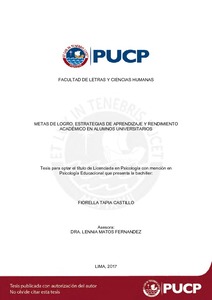Metas de logro, estrategias de aprendizaje y rendimiento académico en alumnos universitarios
Abstract
La presente investigación tiene como propósito analizar la relación que existe entre las
metas de logro (aproximación al dominio, aproximación al rendimiento, evitación al
rendimiento), el uso de estrategias de aprendizaje (superficiales y profundas) y el
rendimiento académico en alumnos de una universidad privada de Lima (Perú). En este
estudio participaron 244 estudiantes pertenecientes al tercer y cuarto año de estudios
(M = 20.80 años, DE =2.67), los cuales contestaron cuestionarios (auto-reportes) acerca
de las metas de logro (AGQ-R, Elliot y Muruyama, 2008) y el uso de estrategias de
aprendizaje (MSLQ, Pintrich, Smith, García y McKeachie, 1991). Las notas del examen
parcial se emplearon para evaluar el rendimiento académico las cuales fueron
estandarizadas al interior de cada clase (Wolters, 2004). Se analizaron las propiedades
psicométricas de los instrumentos y se encontraron evidencias de validez y confiabilidad
de dichos instrumentos en la muestra estudiada. Posteriormente, se analizaron las
relaciones entre las variables (rho de Spearman). Se encontró que las metas de
aproximación al dominio y aproximación al rendimiento se relacionaron de manera
positiva y significativa con el uso de estrategias de aprendizaje superficiales y profundas
pero no se asociaron con rendimiento académico. Las metas de evitación al rendimiento
se relacionaron positiva y significativamente con el uso de estrategias de aprendizaje
superficial y negativamente con el rendimiento académico. Estos hallazgos coinciden
con lo encontrado en la literatura. Sin embargo, se requiere aún mayor estudio en este
tema. The purpose of this research is to analyze the relationship among students’ achievement
goals (mastery-approach, performance-approach, and performance-avoidance goals),
the use of learning strategies (surface and deep) and academic achievement in students
from a private university of Lima (Peru). This study involved 244 students from the third
and fourth year of studies (M = 20.80 years-old, SD = 2.67). They answered self-report
questionnaires on achievement goals (AGQ-R, Elliot y Muruyama, 2008) and the use of
learning strategies (MSLQ, Pintrich, Smith, García y McKeachie, 1991). The midterm
exam grades were used as a measure of academic achievement and the results were
standardized within each class (Wolters, 2004). Psychometric properties were analyzed
and we found evidences of validity and reliability in the studied sample. Subsequently,
correlations analyses (Spearman rho) revealed that mastery-approach goals and
performance-approach goals were positively and significantly related to the use of
surface and deep level learning strategies, but was not related to academic achievement.
Performance-avoidance goals were positively and significantly associated with the use
of surface level learning strategies and negatively with academic achievement. These
findings are in line with what is found in the literature. However, more research is still
needed regarding this topic.
Temas
Objetivos educativos
Aprendizaje (Educación)
Rendimiento académico
Estudiantes universitarios--Investigaciones
Aprendizaje (Educación)
Rendimiento académico
Estudiantes universitarios--Investigaciones
Para optar el título de
Licenciado en Psicología Educacional
Collections
The following license files are associated with this item:






